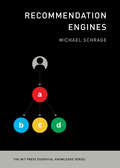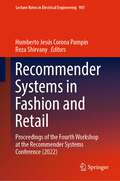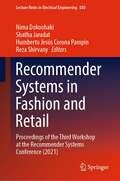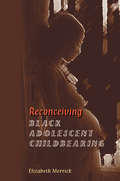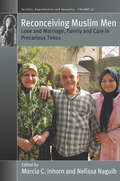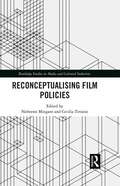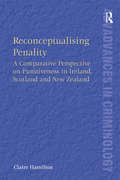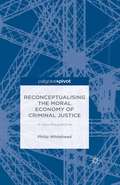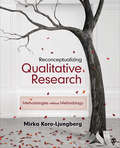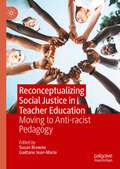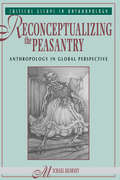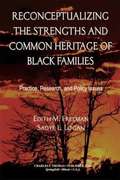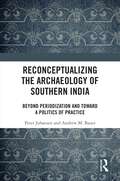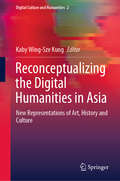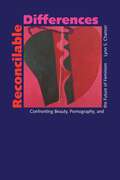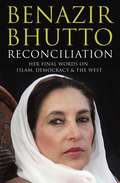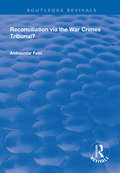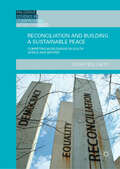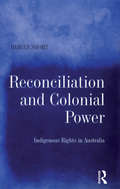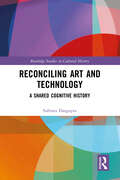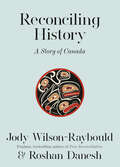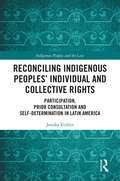- Table View
- List View
Recommendation Engines (The MIT Press Essential Knowledge series)
by Michael SchrageHow companies like Amazon, Netflix, and Spotify know what "you might also like": the history, technology, business, and societal impact of online recommendation engines.Increasingly, our technologies are giving us better, faster, smarter, and more personal advice than our own families and best friends. Amazon already knows what kind of books and household goods you like and is more than eager to recommend more; YouTube and TikTok always have another video lined up to show you; Netflix has crunched the numbers of your viewing habits to suggest whole genres that you would enjoy. In this volume in the MIT Press's Essential Knowledge series, innovation expert Michael Schrage explains the origins, technologies, business applications, and increasing societal impact of recommendation engines, the systems that allow companies worldwide to know what products, services, and experiences "you might also like."
Recommender Systems in Fashion and Retail: Proceedings of the Fourth Workshop at the Recommender Systems Conference (2022) (Lecture Notes in Electrical Engineering #981)
by Humberto Jesús Corona Pampín Reza ShirvanyThis book includes the proceedings of the fourth workshop on recommender systems in fashion and retail (2022), and it aims to present a state-of-the-art view of the advancements within the field of recommendation systems with focused application to e-commerce, retail, and fashion by presenting readers with chapters covering contributions from academic as well as industrial researchers active within this emerging new field. Recommender systems are often used to solve different complex problems in this scenario, such as product recommendations, size and fit recommendations, and social media-influenced recommendations (outfits worn by influencers).
Recommender Systems in Fashion and Retail: Proceedings of the Third Workshop at the Recommender Systems Conference (2021) (Lecture Notes in Electrical Engineering #830)
by Nima Dokoohaki Shatha Jaradat Humberto Jesús Corona Pampín Reza ShirvanyThis book includes the proceedings of the third workshop on recommender systems in fashion and retail (2021), and it aims to present a state-of-the-art view of the advancements within the field of recommendation systems with focused application to e-commerce, retail, and fashion by presenting readers with chapters covering contributions from academic as well as industrial researchers active within this emerging new field. Recommender systems are often used to solve different complex problems in this scenario, such as product recommendations, size and fit recommendations, and social media-influenced recommendations (outfits worn by influencers).
Reconceiving Black Adolescent Pregnancy
by Elizabeth MerrickImages of pregnant Black teenagers and single Black mothers are plentiful in the media and popular culture. These representations have fueled debates on the need for welfare reform and have focused public attention on adolescent pregnancy among Black Americans. In Reconceiving Black Adolescent Pregnancy, Elizabeth Merrick presents a new understanding of childbearing and adolescent development among lower income Black American teenage girls. The author focuses primarily on the individual stories and themes of the six participants in the study. The first section provides the context, and the second section provides the major thematic findings. The final sections focus on agency and identity in this population. The findings that emerged from Merrick's study yield a provocative view that stands in marked contrast to assessments of pregnant Black adolescents as being deviant or greedy for welfare. There is a need for developmental models that start from, or at least incorporate, non-majority experiences. In particular, ethnographic accounts can provide key insights into different developmental pathways. Out of such accounts, new paradigms may also emerge to guide developmental research. Reconceiving Black Adolescent Pregnancy fills this void.
Reconceiving Muslim Men: Love and Marriage, Family and Care in Precarious Times (Fertility, Reproduction and Sexuality: Social and Cultural Perspectives #38)
by Marcia C. Inhorn Nefissa NaguibThis volume provides intimate anthropological accounts of Muslim men’s everyday lives in the Middle East, Asia, Africa, and diasporic communities in the West. Amid increasing political turmoil and economic precarity, Muslim men around the world are enacting nurturing roles as husbands, sons, fathers, and community members, thereby challenging broader systems of patriarchy and oppression. By focusing on the ways in which Muslim men care for those they love, this volume challenges stereotypes and showcases Muslim men’s humanity.
Reconceptualising Film Policies (Routledge Studies in Media and Cultural Industries)
by Nolwenn Mingant Cecilia TirtaineThis volume explores and interrogates the shifts and changes in both government and industry-based screen policies over the past 30 years. It covers a diverse range of film industries from different parts of the world, along with the interrelationship between different localities, policy regimes and technologies/media. Featuring in-depth case studies and interviews with practitioners and policy-makers, this book provides a timely overview of government and industry’s responses to the changing landscape of the production, distribution, and consumption of screen media.
Reconceptualising Penality: A Comparative Perspective on Punitiveness in Ireland, Scotland and New Zealand (New Advances in Crime and Social Harm)
by Claire HamiltonDrastic increases in the use of imprisonment; the introduction of ’three strikes’ laws and mandatory sentences; restrictions on parole - all of these developments appear to signify a new, harsher era or ’punitive turn’. Yet these features of criminal justice are not universally present in all Western countries. Drawing on empirical data, Hamilton examines the prevalence of harsher penal policies in Ireland, Scotland and New Zealand, thereby demonstrating the utility of viewing criminal justice from the perspective of smaller jurisdictions. This highly innovative book is thoroughly critical of the way in which punitiveness is currently measured by leading criminologists. It is essential reading for students and scholars of criminology, penology, criminal justice and socio-legal studies, as well as criminal lawyers and practitioners.
Reconceptualising the Moral Economy of Criminal Justice: A New Perspective
by Philip WhiteheadReconceptualising the Moral Economy of Criminal Justice.
Reconceptualising the Moral Economy of Criminal Justice: A New Perspective
by Philip WhiteheadThis book reconceptualises the concept of moral economy in its relevance for, and application to, the criminal justice system in England and Wales. It advances the argument that criminal justice cannot be reduced to an instrumentally driven operation to achieve fiscal efficiencies or provide investment opportunities to the commercial sector.
Reconceptualizing Qualitative Research: Methodologies without Methodology
by Mirka KoroCalling for qualitative research that is complex, situational, theoretically situated, and yet productive, Reconceptualizing Qualitative Research discusses the multiplicities and uncertainty embedded in different methodological configurations and entanglements that blur the boundaries between doing research, theorizing, thinking, and reflecting. Writing in a clear, conversational style, author Mirka Koro-Ljungberg urges readers to think about qualitative research differently, often in creative ways, and to continuously question existing grand narratives and dogmas.
Reconceptualizing Qualitative Research: Methodologies without Methodology
by Mirka KoroCalling for qualitative research that is complex, situational, theoretically situated, and yet productive, Reconceptualizing Qualitative Research discusses the multiplicities and uncertainty embedded in different methodological configurations and entanglements that blur the boundaries between doing research, theorizing, thinking, and reflecting. Writing in a clear, conversational style, author Mirka Koro-Ljungberg urges readers to think about qualitative research differently, often in creative ways, and to continuously question existing grand narratives and dogmas.
Reconceptualizing Social Justice in Teacher Education: Moving to Anti-racist Pedagogy
by Gaëtane Jean-Marie Susan BrowneThis edited volume explores and extends themes in contemporary educational research on teacher preparation and the evolution in social justice education to antiracist pedagogy. These times call for teacher education to reconsider how the work devoted to social justice is explicit and intentional about its commitment to a racially just society. What does it mean for teacher education to seize this moment to confront racism and inequities that continue to perpetuate in society and school? The book highlights efforts that are being augmented to prepare teacher candidates and future faculty to address systemic racism in their teaching practices.
Reconceptualizing The Peasantry: Anthropology In Global Perspective (Critical Essays In Anthropology Ser.)
by Michael KearneyThe concept of ?peasant? has been constructed from residual images of pre-industrial European and colonial rural society. Spurred by Romantic sensibilities and modern nationalist imaginations, the images the word peasant brings to mind are anachronisms that do not reflect the ways in which rural people live today. In this path-breaking book, Michael Kearney shows how the concept has been outdistanced by contemporary history. He situates the peasantry within the current social context of the transnational and post?Cold War nation-state and clears the way for alternative theoretical views.Reconceptualizing the Peasantry looks at rural society in general and considers the problematic distinction between rural and urban. Most definitions of and debates about peasants have focused on their presumed social, economic, cultural, and political characteristics, but Kearney articulates the way in which peasants define themselves in a rapidly changing world. In the process, he develops ethnographic and political forms of representation that correspond to contemporary postpeasant identities. Moving beyond a reconsideration of peasantry, the book situates anthropology in global context, showing how the discipline reconstructs itself and its subjects according to changing circumstances.
Reconceptualizing The Strengths And Common Heritage Of Black Families: Practice, Research, And Policy Issues
by Edith M. Freeman Sadye Louise LoganThe purpose of this book is to provide a comprehensive analysis and critique of the existing bodies of research literature on black families, children, and communities, and the effects of that literature on the status of this population today. <P><P>New and expanded practice and research frameworks with culturally sensitive guidelines for rebuilding and increasing self- and collective sufficiency of this heterogeneous group is presented. These frameworks are used to propose specific approaches to culturally meaningful research, practice, and policy development related to black families.
Reconceptualizing the Archaeology of Southern India: Beyond Periodization and Toward a Politics of Practice
by Peter Johansen Andrew M. BauerThis book presents a paradigm shift in the long-term study of South India’s deep history. It refuses the disciplinary constraints of history and prehistory and interrogates the archaeological and textual records of the Deccan to disrupt its conventional archaeological periodizations, which have tended to reify and dehistoricize social and cultural differences.This book draws on over 20 years of original archaeological research from the southern Deccan region of India to critically reappraise the historiography that has framed its deep history. It fundamentally questions conventional archaeological paradigms, rooted in early colonial scholarship, which have structured interpretations of deep time with curiously ahistorical narratives of the past. This volume offers a more nuanced assessment of historical changes across a diversity of cultural, social, and political practices through the novel application of theoretical framings to archaeological and historical data, including political ecology, techno-politics, resource materialities, and landscape production.This book will interest an interdisciplinary audience of graduate and undergraduate students and professional academics, primarily in the fields of archaeology, history, and South Asian studies. Its theoretical interventions will also be of interest to those invested in the anthropology and the archaeology of politics, chronology, historicity, historiography, materiality and landscapes.
Reconceptualizing the Digital Humanities in Asia: New Representations of Art, History and Culture (Digital Culture and Humanities #2)
by Kaby Wing-Sze KungThis book examines new forms of representation that have changed our perception and interpretation of the humanities in an Asian, and digital, context. In analyzing written and visual texts, such as the use of digital technology and animation in different works of art originating from Asia, the authors demonstrate how literature, history, and culture are being redefined in spatialized relations amid the trend of digitization. Research studies on Asian animation are in short supply, and so this volume provides new and much needed insights into how art, literature, history, and culture can be presented in innovative ways in the Asian digital world. The first section of this volume focuses on the new conceptualization of the digital humanities in art and film studies, looking at the integration of digital technologies in museum narration and cinematic production. The second section of the volume addresses the importance of framing these discussions within the context of gender issues in the digital world, discussing how women are represented in different forms of social media. The third and final section of the book explores the digital world’s impacts on people’s lives through different forms of digital media, from the electromagnetic unconscious to digital storytelling and digital online games. This book presents a novel contribution to the burgeoning field of the digital humanities by informing new forms of representation and interpretations, and demonstrating how digitization can influence and change cultural practices in Asia, and globally. It will be of interest to students and scholars interested in digitization from the full spectrum of humanities disciplines, including art, literature, film, music, visual culture, media, and animation, gaming, and Internet culture."This is a well-written book, and I enjoyed reading it. The first impression of the book is that it is very innovative - a down-to-the-earth academic volume that discusses digital culture."- Professor Anthony Fung, Professor, Director, School of Journalism and Communication, The Chinese University of Hong Kong "This book has contributed to the existing field of humanities by informing new forms of representation and interpretations, and how digitization may change cultural practices. There is comprehensive information on how the humanities in the digital age can be applied to a wide range of subjects including art, literature, film, pop music, music videos, television, animation, games, and internet culture."- Dr Samuel Chu, Associate Professor, The Faculty of Education, The University of Hong Kong
Reconcilable Differences: Confronting Beauty, Pornography, and the Future of Feminism
by Lynn S. ChancerThis volume examines controversial faultlines in contemporary feminism—pornography, the beauty myth, sadomasochism, prostitution, and the issue of rape—from an original and provocative perspective. Lynn Chancer focuses on how, among many feminists, the concepts of sex and sexism became fragmented and mutually exclusive. Exploring the dichotomy between sex and sexism as it has developed through five current feminist debates, Chancer seeks to forge positions that bridge oppositions between unnecessary (and sometimes unwitting) "either/or" binaries. Chancer's book attempts to incorporate both the need for sexual freedom and the depth of sexist subordination into feminist thought and politics.
Reconciliation
by Benazir BhuttoFormer Prime Minister Benazir Bhutto, the chairperson of the Pakistan People's Party, was seen as vital to that country's future. In exile for years, in late 2007 she felt the time had come to actively re-engage and to return to the country she loved. Part of that process was a clear-eyed assessment of where Pakistan was, and of the nature of its relationship with the West, with Islam, and with extremism. In this important new book, completed just days before her assassination, Ms Bhutto demonstrats that extremism is not inherent to Islam, but that various factors, including some policies of the West, have empowered Islamic fundamentalists and are responsible for the current battle for the hearts, minds and bodies of the Umma (the Islamic nation around the world). RECONCILIATION was her compelling and convincing prescription for the country at the heart of the so-called 'clash of civilizations'. It argues that democracy, economic development, moderation and modernity are the greatest threats to international terrorism. She pledged to work with the United States and the West to ensure that Pakistan ceased to be the petri dish of international radicals, and to re-establish its bona fides as a realistic and effective moderate alternative for one billion Muslims around the world.
Reconciliation Via the War Crimes Tribunal? (Routledge Revivals)
by Aleksandar FaticFirst published in 2000, this volume is an examination of the issues of reconciliation after civil wars and the role international war crimes tribunals play in facilitating that reconciliation, apart from enforcing justice against perpetrators of war crimes. It argues that a war crime tribunal is partial and operates with no regard for the policy purpose of reconciliation, is likely to install all opposites of confidence and security in regions infested by civil warfare, and that their results will thus be counterproductive and will result in further loss of life and destruction.
Reconciliation and Building a Sustainable Peace: Competing Worldviews in South Africa and Beyond (Palgrave Studies in Compromise after Conflict)
by Cathy BollaertThis book explores how competing worldviews impact on intergroup relations and building a sustainable peace in culturally diverse societies. It raises the question of what happens in a culturally diverse society when competing values and ways of interpreting reality collide and what this means for peace-building and the goal of reconciliation. Moreover, it provides a valuable and needed contribution to how peace-building interventions can become more sustainable if tied into local values and embedded in a society’s system of meaning-making. The book engages with questions relating to the extent transitional policies speak to universal values and individualist societies and the implications this might have for how they are implemented in collective societies with different values and forms of social organisation. It raises the question of cultural equality and transformation and whether or not this is something that needs to be addressed within peace-building theory. It argues that inculcating worldview into peace-building theory and practice is a vital part of restoring dignity and promoting healing among victims and formerly oppressed groups. This book, therefore, makes an important contribution to what is at best a partially researched topic by providing a deeper understanding of how identity and culture intersect with peace-building when seeking to build a sustainable peace.
Reconciliation and Colonial Power: Indigenous Rights in Australia
by Damien ShortIn 1991 Australia instigated a national reconciliation project between indigenous and non-indigenous people. Despite being the longest-running reconciliation process, there has been no authoritative study of Australian reconciliation to date. Reconciliation and Colonial Power is the first book to analyze Australian reconciliation as a process, filling a significant gap in theoretical and empirical understanding. Damien Short offers a sociological interpretation of this process which suggests that, rather than being a genuine attempt at atonement, Australian reconciliation is perhaps better understood as the latest stage in the colonial project. He considers the relevance of acknowledgement and apology, restitution and rights, nation building and state legitimacy to the reconciliation project. This work compliments the burgeoning literature on reconciliation theory and practice and provides fertile material for comparisons with reconciliation processes in other countries such as Chile and South Africa.
Reconciling Art and Technology: A Shared Cognitive History (Routledge Studies in Cultural History)
by Subrata DasguptaThis book examines two venerable cultures, art and technology, and uses the young "interdiscipline" of cognitive history combined with case studies of both ancient and modern artifacts to explore, and unveil, some of the bridges by which this reconciliation of two seemingly distant and oppositional cultures can be effected.Art and technology are commonly regarded as oppositional. While both are concerned with made things – artifacts – and both have their origins in pre-literate antiquity, the primary purposes they are intended for are quite distinct: the artifacts of technology serve utilitarian purposes while those of art serve affective needs. This opposition between art and technology, notably argued by such scholars as Lewis Mumford and George Kubler is challenged in this book. For, when we consider art and technology as creative phenomena, then many significant, interesting, and often subtle commonalities emerge whereby a reconciliation – a unity – of these two great cultures seems possible. This book utilizes case studies of both ancient and modern artifacts – ranging from the Nataraja sculpture of ancient India, a great astronomical clock of ancient China, and Japanese Samurai swordmaking, through Gothic cathedrals and Renaissance paintings of Europe to English Elizabethan machinery to the French Impressionists to modernist concrete structures and paintings in both East and West.This book will be of interest to students and professional scholars interested in the histories of art and technology, cultural history, and creativity studies.
Reconciling Canada
by Pauline Wakeham Jennifer HendersonTruth and reconciliation commissions and official governmental apologies continue to surface worldwide as mechanisms for coming to terms with human rights violations and social atrocities. As the first scholarly collection to explore the intersections and differences between a range of redress cases that have emerged in Canada in recent decades, Reconciling Canada provides readers with the contexts for understanding the phenomenon of reconciliation as it has played out in this multicultural settler state.In this volume, leading scholars in the humanities and social sciences relate contemporary political and social efforts to redress wrongs to the fraught history of government relations with Aboriginal and diasporic populations. The contributors offer ground-breaking perspectives on Canada's 'culture of redress,' broaching questions of law and constitutional change, political coalitions, commemoration, testimony, and literatures of injury and its aftermath. Also assembled together for the first time is a collection of primary documents - including government reports, parliamentary debates, and redress movement statements - prefaced with contextual information. Reconciling Canada provides a vital and immensely relevant illumination of the dynamics of reconciliation, apology, and redress in contemporary Canada.
Reconciling History: A Story of Canada
by Jody Wilson-Raybould Roshan DaneshOne of Indigo's Top 10 History Books of 2024 and Top 100 Books of 2024 • One of the Toronto Star&’s 25 books to read this seasonFrom the #1 national bestselling author of 'Indian' in the Cabinet and True Reconciliation, a truly unique history of our land—powerful, devastating, remarkable—as told through the voices of both Indigenous and non-Indigenous peoples.The totem pole forms the foundation for this unique and important oral history of Canada. Its goal is both toweringly ambitious and beautifully direct: To tell the story of this country in a way that prompts readers to look from different angles, to see its dimensions, its curves, and its cuts. To see that history has an arc, just as the totem pole rises, but to realize that it is also in the details along the way that important meanings are to be found. To recognize that the story of the past is always there to be retold and recast, and must be conveyed to generations to come. That in the act of re-telling, meaning is found, and strength is built.When it comes to telling the history of Canada, and in particular the history of the relationship between Indigenous and non-Indigenous peoples, we need to accept that the way in which our history has traditionally been told has not been a common or shared enterprise. In many ways, it has been an exclusive and siloed one. Among the countless peoples and groups that make up this vast country, the voices and experiences of a few have too often dominated those of many others.Reconciling History shares voices that have seldom been heard, and in this ground-breaking book they are telling and re-telling history from their perspectives. Born out of the oral history in True Reconciliation, and complemented throughout with stunning photography and art, Reconciling History takes this approach to telling our collective story to an entirely different level.
Reconciling Indigenous Peoples’ Individual and Collective Rights: Participation, Prior Consultation and Self-Determination in Latin America (Indigenous Peoples and the Law)
by Jessika EichlerThis book critically assesses categorical divisions between indigenous individual and collective rights regimes embedded in the foundations of international human rights law. Both conceptual ambiguities and practice-related difficulties arising in vernacularisation processes point to the need of deeper reflection. Internal power struggles, vulnerabilities and intra-group inequalities go unnoticed in that context, leaving persisting forms of neo-colonialism, neo-liberalism and patriarchalism largely untouched. This is to the detriment of groups within indigenous communities such as women, the elderly or young people, alongside intergenerational rights representing considerable intersectional claims and agendas. Integrating legal theoretical, political, socio-legal and anthropological perspectives, this book disentangles indigenous rights frameworks in the particular case of peremptory norms whenever these reflect both individual and collective rights dimensions. Further-reaching conclusions are drawn for groups ‘in between’, different formations of minority groups demanding rights on their own terms. Particular absolute norms provide insights into such interplay transcending individual and collective frameworks. As one of the founding constitutive elements of indigenous collective frameworks, indigenous peoples’ right to prior consultation exemplifies what we could describe as exerting a cumulative, spill-over and transcending effect. Related debates concerning participation and self-determination thereby gain salience in a complex web of players and interests at stake. Self-determination thereby assumes yet another dimension, namely as an umbrella tool of resistance enabling indigenous cosmovisions to materialise in the light of persisting patterns of epistemological oppression. Using a theoretical approach to close the supposed gap between indigenous rights frameworks informed by empirical insights from Bolivia, the Andes and Latin America, the book sheds light on developments in the African and European human rights systems.
